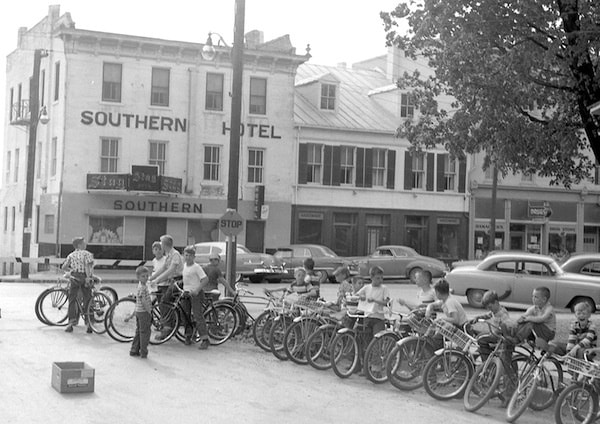Fond memories from Waterloo’s ‘Main Street Kids’

Early 1950s Main Street in Waterloo was home to a variety of businesses and residences, and served as the playground for a generation of youth. Pictured, the Waterloo Optimist Club holds a bicycle inspection on Main Street in 1954 against the backdrop of the Southern Hotel (now Subliminal Subs). (Bob Voris photo)
During the summer months of 1942, the Capitol Theatre in Waterloo entertained large crowds of moviegoers eager to see Disney’s new animated release “Bambi.”
The bandstand on the courthouse lawn next door had been spruced up recently and was ready for another Tuesday night performance by the Waterloo Municipal Band.
The trees on the courthouse lawn provided shade for older folks who sat on benches during the day, visiting and reminiscing.
Three young preschool children played nearby on the lawn, collecting buckeyes and sometimes jumping on their wagons and racing down the hill and around the corner — not worrying too much about the light traffic that would have been evident on a quiet summer afternoon in the 1940s.
Those three children, Jean Wallhaus, Beverly Fyke and Tom Wightman, were fixtures of Waterloo’s uptown during the 1940s, and shoppers would more than likely run into the trio.
“We grew up on Main Street. I call us the ‘Main Street Kids,’” said Jean Wallhaus Stogner.
Stogner lived her entire life in an apartment above the Wallhaus Hardware store, which was located next to the Southern Hotel in the storefront that now houses Subliminal Subs. The hardware store was first owned by her grandfather, and later her father. To her, Main Street and the surrounding courthouse lawn, sidewalks and businesses were what she knew as her home and playground.
Next door, Wightman’s parents would bring him along to his grandfather’s drugstore, Hamacher’s, when they went to work there each day.
“I think I came to work with them each day so that they could get me out of the house,” he said.
Although Wightman feels that he also grew up on Main Street, “home base” was actually the stately brick home on the corner of Market and Hamacher streets. Later, as a newlywed, he lived above the drug store. Today, his sister Betty occupies the apartment above the store — now Wightman’s Pharmacy.
“I didn’t live on Main Street like Jean and Beverly did. I guess I was sort of a visitor,” Wightman remarked. “But I remember playing with those girls many days. Jean and I were even allowed to ride our tricycles up and down the aisles of the drug store.”
Beverly Fyke Bradley and her mother, Dorothy Eppinger Fyke, had moved back to Waterloo from Florida when Beverly was a toddler.
“My parents were divorced and my mother and I came to live with my grandparents, who ran the City Hotel,” Bradley recalls.
Bradley’s grandfather Charles Eppinger, like many businessmen of the day, started out farming in Valmeyer as a young man and was able to make a good enough living to eventually purchase the City Hotel, a building that is now home to Bountiful Blossoms at 121 South Main Street. He moved his family to Waterloo in the mid-1900s and began running the hotel.
“My mother and I, plus the rest of the family and my grandparents, lived in the hotel. The vacant rooms were occupied by boarders,” Bradley recalls.
Downstairs was a restaurant and bar area where family members helped serve food and drink to patrons.
During the Prohibition years (1920 to 1933), Eppinger converted the bar area into a grocery store, with the family helping to stock products and fill orders for shoppers.
“Once Prohibition ended, it wasn’t long before my grandfather brought the bar back,” Bradley said with a chuckle.
Although they all grew up together during a turbulent time in American history, none of the “Main Street Kids” recall hearing of scandalous trials at the courthouse or any wild skirmishes at neighborhood taverns. All of them remember carefree times and, as Stogner recalls, “making our own fun.”
“Waterloo was just a sleepy little town at that time. Everyone knew everyone else,” Wightman remarked.
All three of the friends recall visiting Rex’s Confectionery, located across the street from the Capitol Theatre. In fact, Stogner and Bradley have fond recollections of Rex’s wife, Alyda Rexroth.
“She was a lovely woman. Jean and I happened to be at the Capitol watching a ‘Frankenstein’ horror movie. Alyda was there, and she comforted both of us when we became terrified during the show,” Bradley said.
The trio recalls traveling to Back’s Dry Goods store, now the site of First National Bank.
“You could get material, any fabric, and sewing needs. You could buy underwear there and I even think there was a rack of dresses you could look at,” Stogner added.
Watching Mrs. Schulmeister of Schulmeister’s Bakery, located where HTC’s main branch is now, use the bread slicer was something all the friends recalled. They told of watching in amazement as she ran the large bread slicer and then wrapped the bread in a waxy sort of blue-and-white paper that was heat-sealed.
“They also had a glass-cased candy counter with plenty of licorice and penny candy available,” Stogner said.
Across the street to the north, Stogner spent time at the home of the Dement sisters. The sisters gave piano and dance lessons to local children.
“I would often wait outside the Dement sisters’ home while Jean finished up her lessons,” Bradley recalls.
Too shy to protest, Wightman also remembers taking dance lessons with the sisters.
“I don’t think the lessons lasted too long for me. I finally worked up the courage to say ‘No!’” Wightman remembers.
Tuesday and Friday nights were particularly memorable nights for all three of the friends. Stogner and Bradley would sometimes sit in upstairs windows of their families’ businesses and listen to the Waterloo Municipal Band perform weekly concerts.
“We all loved those concerts. Everyone sitting around with friends. Older folks on the park benches talking. Kids running around. Such a feeling of community and family,” Bradley said.
All of the friends also recall the way folks sitting in their cars would honk horns after a performance instead of clapping.
“The drugstore would stay open until 9 p.m., so I would be working there during concerts when I was older,” Wightman recalls. “I certainly remember how people would double park during the concert and how, if you were parked in front, you were stuck until it was over.
“Friday night was the night all the farmers came to town to shop. The stores were open at night and Main Street was a busy place.”
Although they didn’t realize it, all three were affected by World War II — even in small ways.
“Gas and tires were rationed at that time. There wasn’t a lot of traffic. This was why we were able to race our wagons down the hilly street and around the corner,” Bradley recalled.
“My buddies and I would watch the newsreels and the black-and-white war movies. We would pretend our baseball bats were our guns. We’d speak in German accents and play war games. That’s what boys played back then, because it was on our minds all the time,” Wightman said.
The trio recalls what a treat it was to buy an ice cream soda at Hamacher’s.
“In the early years, doctors filled prescriptions at their offices and carried them around in their medical bags. Our drugstore wasn’t like the pharmacies of today. My grandfather and father sold wallpaper and paint, window glass and various general-store type sundries. We had the soda fountain, too. Drugstores had to do that to make money.”
In addition to collecting the buckeyes and having her father make them into little baskets for her, Stogner recalls romping on the courthouse lawn and jumping in piles of leaves during autumn months. Bradley recalls the piles of leaves, also.
“Mr. Amich was the courthouse custodian. He would rake up great piles of leaves from those big chestnut trees. He didn’t mind when we jumped in them. He was such a sweet man.”
Although the Main Street landscape has changed little since the three friends lived there, they do recall the fountain that once stood on the courthouse lawn near the bandstand. They also speak of Bodenbach’s Haberdashery, Bersche’s Jewelers, Mueller’s Dry Goods and Roever’s Café.
All of them recall the “Nickel Block,” where shoppers could purchase items for a nickel. Like anyone who grew up in Waterloo from the early part of the century to the 1950s and beyond, all three fondly recall sledding on Third Street — known affectionately as Rex’s Hill due to the proximity to Rex’s Corner.
“I remember Rex coming out when the war ended, banging on a big washtub. Everyone on Main Street was cheering and hollering,” Wightman added.
Wightman eventually took over ownership of the family business. Stogner married in 1956 and raised a large family. Bradley’s grandparents sold the City Hotel in 1945, and the families moved to a home not far away. She eventually married and has lived in various locales such as Puerto Rico and Florida.
All three friends take delight in recalling days spent growing up on Main Street, and all are grateful to have grown up in a small town.
“It is so wonderful when children are about to grow up in a community where people are supportive. Young people today don’t always have that behind them,” Bradley remarked. “Growing up as we did in a small town and on Main Street provided us with a sense of confidence and security. That, in turn, provided a firm foundation for me as I traveled and lived various places over the years.”






